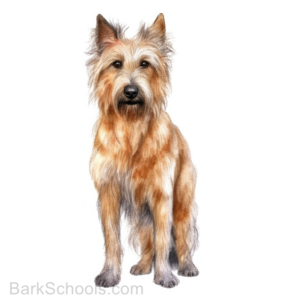Are you curious about Berger Picard?
If you are considering adding a Berger Picard to your family, you may be curious about their traits, characteristics, and behaviors. In this informative article, you will learn all about the Berger Picard breed, including their social behavior, trainability, personality, and common health issues.
Berger Picard Traits & Characteristics
The Berger Picard is a medium-sized breed known for their alert and lively personality. They are intelligent, energetic, and loyal dogs, making them great companions for active families.

Family Interactions
Berger Picards are known to be affectionate and loyal towards their families. They enjoy spending time with their human companions and are often eager to participate in family activities. With proper socialization and training, they can get along well with children and other pets in the household.
Physical Characteristics
- Coat: The Berger Picard has a double coat that is rough and tousled in appearance. They shed moderately and require regular grooming to maintain their coat’s health and appearance.
- Drooling: Berger Picards are not heavy droolers, making them a more low-maintenance breed in terms of cleanliness.
- Fur coat: Their fur coat is described as rough and tousled, giving them a rugged appearance that matches their energetic personality.
Social Behavior
Berger Picards are typically reserved but not aggressive towards strangers. They are known to be playful and enjoy interactive activities with their families. They also have a watchful nature, making them excellent watchdogs. In terms of adaptability, Berger Picards can adjust well to different living situations with proper training and socialization.

Personality
- Trainability Level: Berger Picards are intelligent dogs that respond well to positive reinforcement training methods. They are eager to please and enjoy learning new tricks and commands.
- Energy Level: This breed is highly energetic and requires daily exercise to stay mentally and physically stimulated.
- Barking Level: Berger Picards are not excessive barkers but may alert their owners to strangers or changes in their environment.
- Mental Stimulation Needs: Due to their high intelligence and energy levels, Berger Picards benefit from mental stimulation activities such as puzzle toys and training exercises.
Trainability
Berger Picards are intelligent and eager to please, making them relatively easy to train with consistent and positive reinforcement methods. They respond well to praise and rewards, and their high energy levels make them quick learners when engaged in training sessions.
Common Health Issues
While Berger Picards are generally healthy dogs, they may be prone to certain health issues common in the breed. Some of the health concerns to be aware of include hip dysplasia, progressive retinal atrophy, and patellar luxation. Regular veterinary check-ups and a healthy diet can help mitigate these potential health issues.
Facts you should know about Berger Picard
Are Berger Picard suitable for non-experienced owners?
Berger Picards are intelligent and trainable dogs, making them suitable for first-time dog owners who are willing to invest time and effort into training and socialization.
How difficult are Berger Picard to train?
Although they are intelligent and eager to learn, Berger Picards have high energy levels that require consistent training and mental stimulation to prevent boredom and behavioral issues.
Does the owner need to be aware of Berger Picard potential health issues?
Yes, owners should be aware of common health issues in Berger Picards and be proactive in monitoring their dog’s health through regular check-ups and a nutritious diet.
How active are Berger Picard?
Berger Picards are highly active dogs that require daily exercise to maintain their physical and mental well-being.
How long should I walk my Berger Picard?
A Berger Picard should ideally get at least an hour of exercise per day, which can include walks, runs, and interactive play sessions.
Do Berger Picard tend to damage the house when left alone?
Berger Picards may exhibit destructive behaviors when left alone for extended periods, especially if they are not adequately exercised or mentally stimulated.
How often will I need to groom a Berger Picard?
Berger Picards require regular grooming to maintain their coat’s health and prevent matting. Brushing them a few times a week and occasional baths are recommended to keep their fur clean and manageable.
Are Berger Picard vocal dogs?
While Berger Picards are not excessive barkers, they may bark to alert their owners to unfamiliar sounds or people in their environment.
How friendly are Berger Picard with new people?
Berger Picards are typically reserved but not aggressive towards strangers. Proper socialization at a young age can help them feel more comfortable around new people.
Do Berger Picard get along with other dogs?
With proper socialization, Berger Picards can get along well with other dogs in the household. Introducing them to new dogs gradually and in controlled environments is key to successful interactions.
What are the space requirements for Berger Picard?
Berger Picards do well in homes with a fenced yard where they can run and play. They are active dogs that require ample space to exercise and burn off their energy.
Berger Picard Nutrition and Feeding
When it comes to feeding your Berger Picard, it is essential to provide a balanced diet that meets their nutritional needs. High-quality dog food that is appropriate for their age, size, and activity level is recommended. Ensure to feed them in appropriate portions to maintain a healthy weight and prevent obesity.
Berger Picard Dog History and Origins
The Berger Picard is an ancient French herding breed that has been around for centuries. They were primarily used as working dogs on farms, herding livestock and protecting the property. Over time, they have become popular family pets due to their loyal and intelligent nature.
In conclusion, Berger Picards are intelligent, energetic, and loyal dogs that make great companions for active families. With proper training, socialization, and care, they can thrive in a loving home environment. Remember to consider their exercise needs, grooming requirements, and potential health issues when considering this unique and versatile breed.
